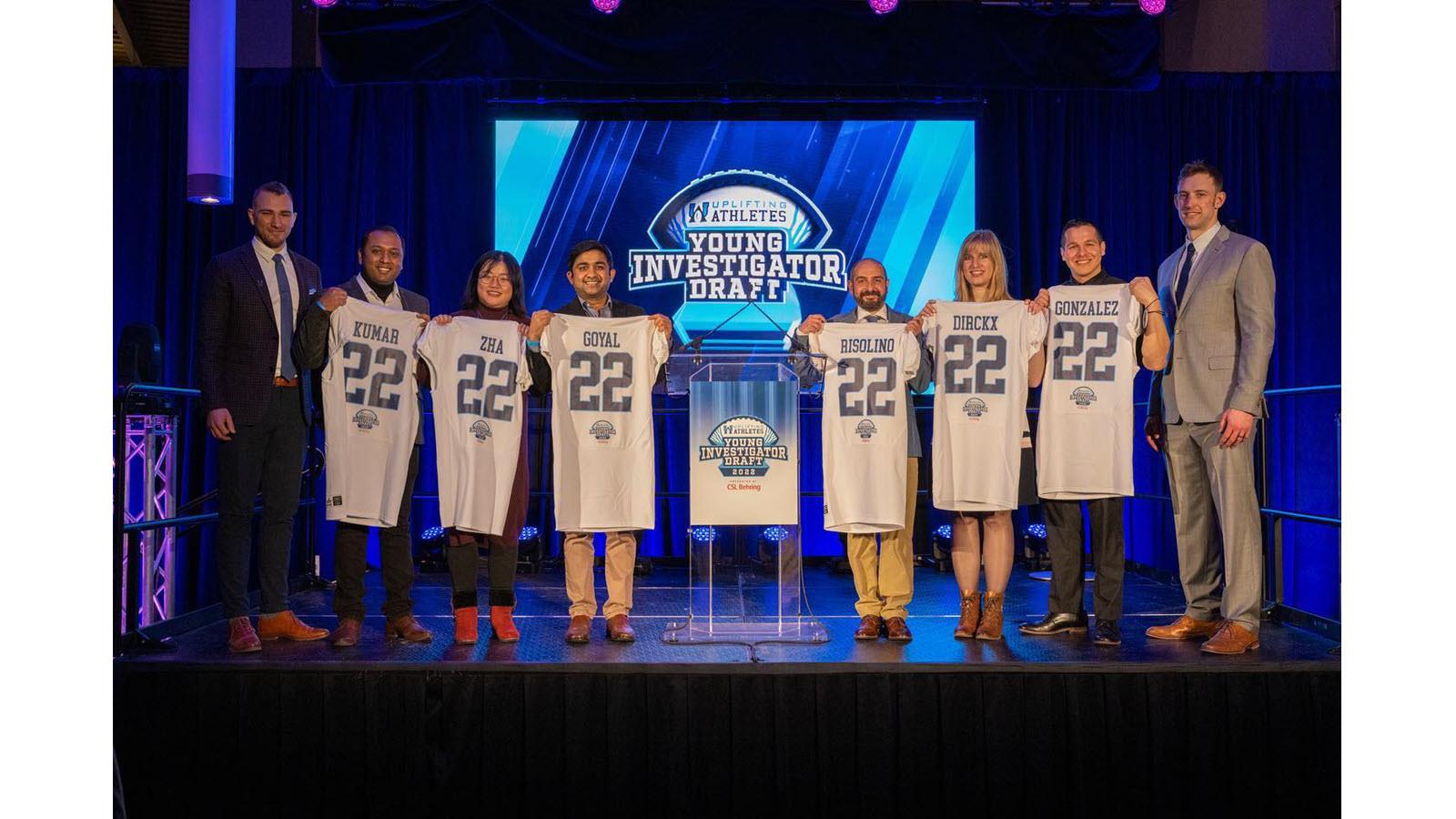Last weekend at Lincoln Financial Field, all the cheers were for rare disease research.
Nine scientists were celebrated for their work in rare disease at the fifth annual Uplifting Athletes Young Investigator Draft presented by CSL Behring. Each received an unrestricted $20,000 grant to support their areas of inquiry, including rare cancers, rare blood disorders, genetic disorders and rare diseases affecting muscles and nerves.
“We believe these all-star scientists deserve to be lauded with the same excitement afforded to college and professional athletes, many of whom partner closely with us to support our mission,” said Rob Long, Executive Director, Uplifting Athletes, a nonprofit committed to raising awareness about rare diseases. Rare disorders affect one in every 10 people in the United States, said Long, who played football at Syracuse University and survived a rare cancer.
Why are these scientists focused on rare diseases? We sampled this year’s winners and here’s what they said.
Ji Zha, PhD - The Children's Hospital of Philadelphia
Nominated by: Team Telomere
“I personally know of some people who had rare diseases and that influenced me. I feel the research we do is serving children. I always wanted to do research in science and I was always interested in rare diseases. I also remember the ALS Ice Bucket Challenge and that impacted me. There is not enough funding for rare diseases. There’s more awareness and I think that is good for the community. But I feel sometimes, with a little more research available, it might not be as hard for patients going forward.”
Shu-Yi Liao, MD, MPH, ScD - National Jewish Health, Denver
Nominated by: Foundation for Sarcoidosis Research
“One of the reasons I enjoy this research is – not only is all of it rare – but some of it's very rare, under-recognized and a lot of people are getting the wrong treatments. The reason I’m really interested in rare disease is to help people get the right treatment and for it to be better recognized overall.”
Naomi Dirckx, PhD - Johns Hopkins University
Nominated by: TESS Research Foundation
“It is great to work with a rare disease organization because the patients are so close and it gives you such motivation. It puts me very close to the real world of this when I’m doing my research.”
Karine Doiron, PhD - CHU Sainte-Justine Research Center; Université de Montréal
Nominated by: TBRS Community
“First, each rare disease is rare individually but collectively there are nearly 300 million patients worldwide. It’s a challenge to understand the underlying components of more common diseases and use them to help rare disease patients. I think each rare disease community is a big family. The organization I’m with, the support they provide to those kids and their families is amazing. When I learned the stories about the families, it motivated me to push my work even further. It was inspiring.”
Michael Gonzalez, PhD - University of Pennsylvania
Nominated by: Castleman Disease Collaborative Network
“Just by virtue of being a rare disease, they are historically underfunded and they don’t get the attention they deserve. At the end of the day, what drives me is helping people. And I chose to focus almost entirely on rare diseases because not a lot of scientists are looking into the corners for these rare diseases.”
Dr. Sushant Kumar, PhD - University of Pennsylvania
Nominated by: The Aplastic Anemia and MDS International Foundation
“I was always very interested in rare diseases all along because I knew there was less research that was being done. The problem with rare diseases is people don’t want to invest money in them because there is not always a lot of benefit financially. But these patients, 75 percent of them are children and we have to take care of them. I wanted to help people, and for me the most help I felt I could do was to focus on those who have rare diseases with my research.”
Other grant recipients included:
Wu Chen, PhD - Baylor College of Medicine
Nominated by: STXBP1 Foundation
Gaurav Goyal, MD - University of Alabama at Birmingham
Nominated by: ECD Global Alliance
Maurizio Risolino, PhD - University of California, San Francisco
Nominated by: T.E.A.M. 4 Travis (Together Ending Asplenia Mortality)
Supporting the Uplifting Athletes mission are 26 collegiate chapters led by student-athletes, including 25 men’s football teams and one women’s soccer team, and more than 80 pro ambassadors from the National Football League (NFL) and Major League Baseball (MLB).
To date, the Young Investigator Draft has awarded $620,000 in grants to 34 researchers. CSL Behring, a global leader in treating rare and serious diseases, has been the title sponsor of the Draft since year one.
“Like Uplifting Athletes, CSL Behring is committed to advancing rare disease research,” said Kevin Kovaleski, Vice President, Global Commercial Development, Transplant, CSL Behring. “Both of our organizations keep rare disease patients at the center of everything we do. And a crucial component of that is supporting innovative research.”



